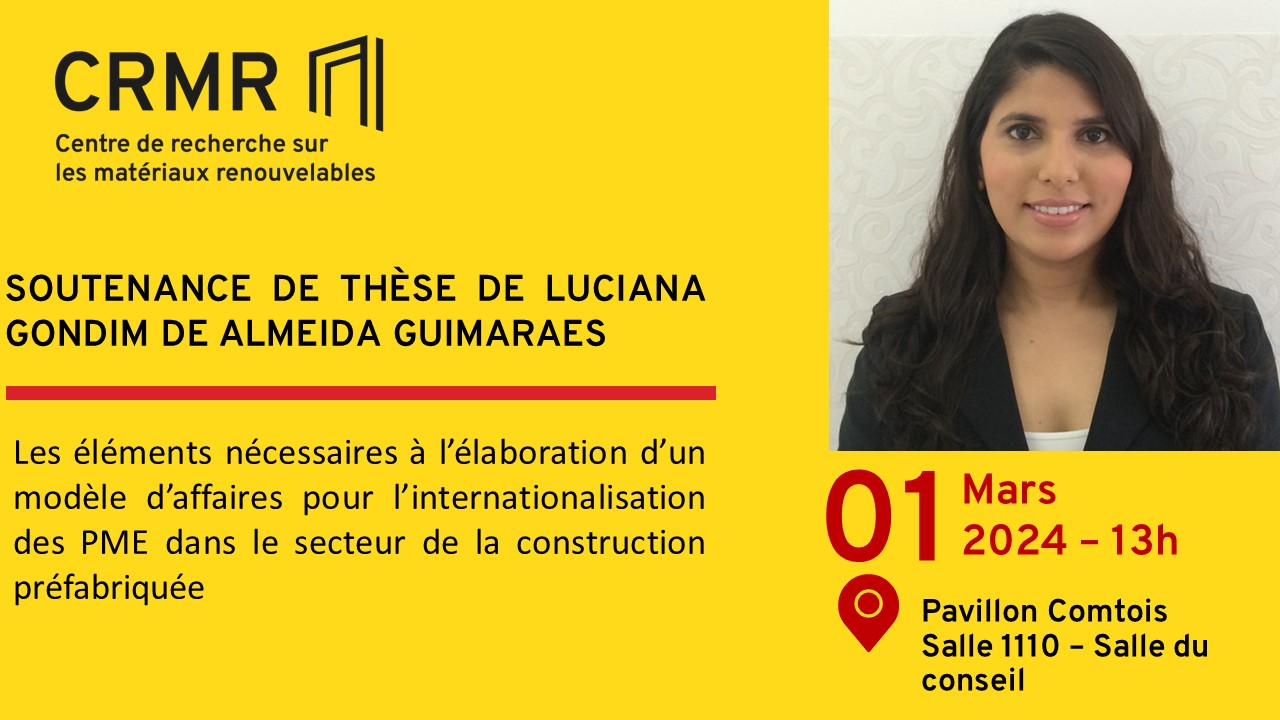Luciana Gondim de Almeida Guimaraes’ thesis defense
You are cordially invited to attend the thesis defense of Luciana Gondim de Almeida Guimaraes, a Ph.D. student in wood and bio-based materials engineering, which will take place in presence, on Friday, March 1, 2024 at 1 p.m. (Quebec City time).
When and where?
March 1, 2024 at 1 p.m.
Comtois Pavilion
Room 1110 – Boardroom
Laval University, Quebec City
Welcome to all!

The members of the jury are:
Marie-Hélène Vandersmissen, President
Faculty of Forestry, Geography and Geomatics – Université Laval
Pierre Blanchet, Research Director
Faculty of Forestry, Geography and Geomatics – Université Laval
Yan Cimon, Co-Research Director
Faculty of Administrative Sciences, Université Laval
Nancy Gélinas, Examiner
Faculty of Forestry, Geography and Geomatics – Université Laval
Amin Chaabane, External Examiner
School of Advanced Technology
Thesis title: Necessary elements for the development of a business model for the internationalization of SMEs in the prefabricated construction sector
Summary: Companies in Quebec’s prefabricated wood construction sector have perceived an opportunity in the North American export market due to their growth rate and geographic proximity. Moreover, increasing product exports is a strategy encouraged by the Quebec government. The goal is to increase exports of prefabricated buildings, mainly made of wood, from $390 million in 2016 to $3 billion by 2030.
This thesis aims to propose the elements needed to develop a business model for the internationalization of alliances between SMEs in the prefabricated wood construction sector.
The results showed that networks, particularly clusters, are a form of collaboration widely explored in the literature, especially in applied research. Although the literature review emphasizes the importance of clusters as a mode of collaboration between SMEs, this collaboration requires the participation of organizations other than companies, such as the government, NPOs, universities, etc. In addition, other forms of cooperation, such as strategic alliances, joint ventures, etc., are also explored. In addition, other forms of collaboration, such as strategic alliances, joint ventures, and consortiums, have proved relevant to SMEs. An analytical risk structure has been developed for the entire prefabricated wood construction sector and can be used by companies wishing to start an alliance. Thirty-six risks were identified, comprising 21 operational risks and 15 financial risks. Comparing the criticality of the operational and financial risks identified, it appears that the financial risks are more critical. A proposed conceptual framework incorporates the dynamic capabilities associated with governance choice factors. The results indicate that companies need to identify and develop their capabilities to assess governance choice factors. Most of the factors for the two alliances analyzed suggest that they should adopt an equity-based governance structure. Thus, the joint venture emerges as an appropriate choice in line with these analytical criteria

